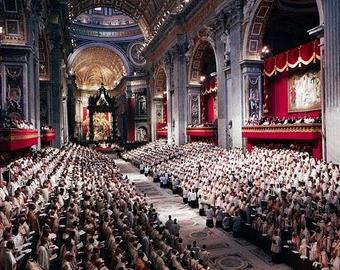A Vatican II Overview
 The fiftieth anniversary of the beginning of Vatican II inspires me to reflect upon a few things about what that Council meant for us. We can sometimes forget the powerful grace that was given to us all through that gathering in Rome from 1962 to 1965. Pope John XXIII called the Council to “open the windows” and on the first day he urged the Council's bishops to use healing mercy in their deliberations, rather than severity.
The fiftieth anniversary of the beginning of Vatican II inspires me to reflect upon a few things about what that Council meant for us. We can sometimes forget the powerful grace that was given to us all through that gathering in Rome from 1962 to 1965. Pope John XXIII called the Council to “open the windows” and on the first day he urged the Council's bishops to use healing mercy in their deliberations, rather than severity.
Many Vatican insiders resisted his insistence that the Council not repeat what had been said before, but that they bring the Church into the modern world. At the time, every priest, before he was ordained, had to make an oath against “modernism,” an order shaped by Vatican I, which met from 1869 to 1870 (300 years after the post-reformation Council of Trent). The modern and scientific world seemed to be a threat to the stability of the Church. The Holy Spirit was the grace that filled the Church to allow the transformation that happened during that Council. One key to the changes which occurred was the brilliant, graced decision, that all these bishops from all over the world, just couldn't sit at meetings all day - and it was Rome, after all. So, they decided that every afternoon, there would be “classes” offered for the Bishops to attend, offered by the periti (the experts theologians, who were preparing the Council). Each afternoon, the Bishops (along with Protestant - and yes, some women - guests) attended classes together on Scripture, History, Sacramental History. It was an eye and soul opening experience for them all. It is testament to the power of education.
It was so transformative that, when the Vatican insiders presented a draft of a document on the Church, which was modeled, almost paragraph for paragraph, after the one from Vatican I, the Council Bishops voted it down. (That document did not mention the “laity” at all.) Instead, the Bishops (along with their theologians) prepared a new “dogmatic” document on the Church, which boldly proclaimed that the “Church is the People of God.” In addition, they crafted a second document, a “pastoral” document, entitled, “The Church in the Modern World,” an almost unbelievable title, given the previous century's battle against all that was “modern.” That document begins with these words, “The joys and the hopes, the griefs and the anxieties of the men of this age, especially those who are poor or in any way afflicted, these are the joys and hopes, the griefs and anxieties of the followers of Christ. Indeed, nothing genuinely human fails to raise an echo in their hearts.” The document is a profound recognition of the presence of God in the world and the importance of our role in dialogue with the world today, most especially on behalf of the dignity of every human person.
The Council produced ground breaking documents on Liturgy, on the Laity, on Religious Life, on Priesthood, on Bishops and Collegiality, on Religious Liberty, on Ecumenism, on Relations with Non-Christians, on Education, on the Media and Social Communication.
Our challenges have changed over the past 50 years. There are still forces which try to divide us and work against Holy Spirit which wants to unite us in our efforts to be one in service of others - to overcome obstacles to continuing conversion and renewal. As the last two Popes have reminded us, “relativism” is a major challenge of today. it is very easy to “blend into” the values of the world around us. The “new evangelization” - the new form of proclaiming the Gospel today - is all about what Benedict XVI said to the Society of Jesus at our last General Congregation: to go to those non-geographical frontiers, where the message of Jesus has not yet been preached, or where it has been heard, but not yet fully accepted.
As beneficiaries of the graces that flowed through the Church through Vatican II, and desiring to grow in our common relationship with a God of love in this Year of Faith, let us remember this special anniversary with deep gratitude to a God who remains so very faithful to us.
Andy Alexander, S.J.